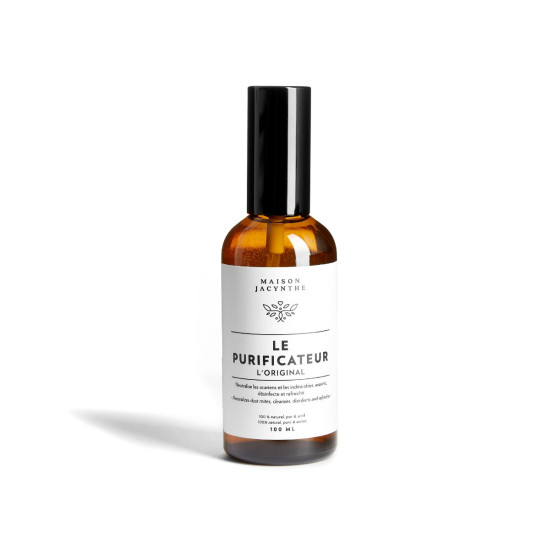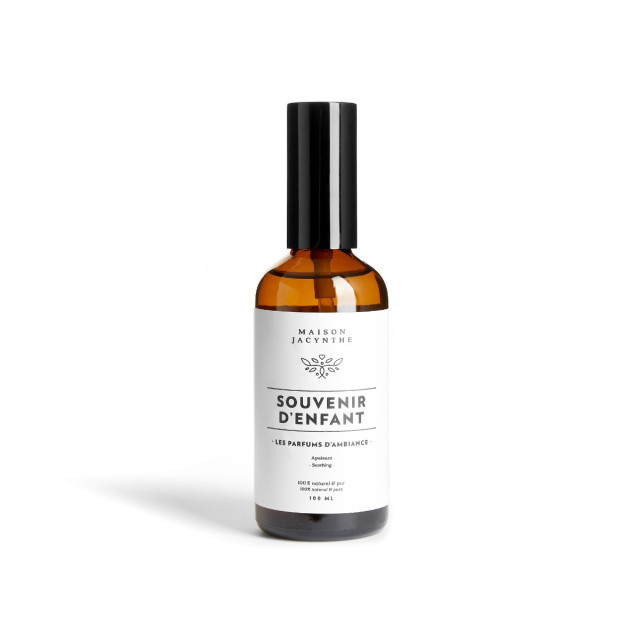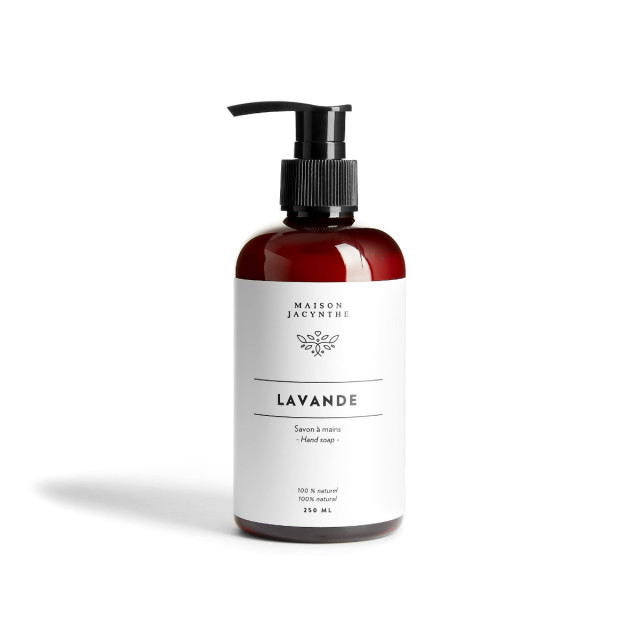Room spray - Le Purificateur, l'original
The Purifier, the original
Room spray – Le Purificateur, the Original
100ml
Essential Oils - Certified Pure
The all-purpose room spray, the Purifier, the Original is particularly distinguished by its touch of lemony lavender. Its reputation is well established, it is a real odor neutralizer; it will sanitize your fabrics and sports equipment in a pleasant and effective way. This is the perfume that disinfects and refreshes!
Its Smell:
The floral and sweet scent of Lavender blends pleasantly with the fresh and camphorous Eucalyptus and the tonic and sparkling Lemon, thus leaving invigorating scents of freshness. The Purifier, the Original is a must have!
Properties:
-
A sanitizing and ecological room spray that brings a healthy touch and the effect of cleanliness that we appreciate in all our living spaces.
-
Made from premium natural essential oils.
-
This natural and ecological home fragrance advantageously replaces synthetic fragrances and chemical room sprays, without compromise.
-
Easy to use thanks to its practical spray cap.
-
100% natural & pure
-
Without preservative
Featured Ingredients:
-
Lavender: this Provencal admirably plays its role of antiseptic and calming. It blends admirably with several essential oils.
-
Lemon: undoubtedly a very versatile oil, among its most popular properties: antibacterial, antiseptic, purifying
-
Eucalyptus radiata: this Australian oil is very popular for its antibacterial, antiseptic and antiviral properties.
Tips and advice for use:
Directions: apply to mattress and pillow once a month (wash sheets with Lavage formula). For sports equipment, this will be as needed, with each use or if the equipment is wet.
Tip: Jacynthe does not hesitate to spray her wet cloths in the bathroom and entrance mats to sanitize them.
Note: before using The Purifier in your home or office, it is recommended to open the windows to ventilate and above all to reduce the level of indoor pollution.
Ingredients: Alcohol denat (Denatured alcohol), Lavandula angustifolia (True lavender) oil, Litsea cubeba (Exotic verbena) oil, Citrus aurantium (Petit grain) oil, Cinnamomum camphora (Ho wood) bark oil, Citrus limonum (Lemon) oil, Eucalyptus radiata (Eucalyptus radiata) oil.
Essential oils and dust mites
Reducing exposure to dust mite allergens in bedding and clothing is likely to be an important environmental control measure for the management and prevention of asthma as well as atopic dermatitis.1 Although it is possible to remove more than 95% of allergens from items by washing in cold or lukewarm water,2 this does not significantly reduce live dust mite populations, because killing dust mites requires washing at 55°C.2 The use of essential oils in bedding and clothing is a good practice.
One study showed that eucalyptus oil, which is a widely available essential oil, can be formulated with a specific kitchen detergent concentrate to form an inexpensive miticidal wash. Its ability to reduce the replenishment of wild populations of live mites found in blankets during normal machine washing by over 95% has been demonstrated. Clove, rosemary, matricaria, and caraway oils, among others, have been shown to have high activity.3
Another study compared the relative acaricidal activity of three essential oils: tea tree, lavender and lemon. The result: the most effective essential oil against mites was tea tree oil; lavender was the second most effective and lemon oil showed activity against mites.4
An experiment is reported in this other study on the comparison of the repellent effect of two essential oils (Matricaria chamomilla, Lavandula angustifolia) against mites, Dermatophagoids farinae and D. pteronyssinus in bed fabric. The essential oils were applied by direct contact at different doses and exposure times. The result of this experiment suggests that two oils have significant repellent activity. Chamomile essential oil in 0.0125 μl/cm2 at 240 minutes caused 93.7% repellent effect and lavender essential oil in 0.05 μl/cm2 at 180 minutes caused 88.9% repellent effect. 5
References
- Harving H, Korsgaard J, Dahl R, Beck HI, Bjerring P. House dust mites and atopic dermatitis. A case-control study on the significance of house dust mites as etiologic allergens in atopic dermatitis. Ann Allergy. 1990 Jul;65(1):25-31. PMID: 2368932.
- McDonald LG, Tovey E. The role of water temperature and laundry procedures in reducing house dust mite populations and allergen content of bedding. J Allergy Clin Immunol. 1992 Oct;90(4 Pt 1):599-608. doi: 10.1016/0091-6749(92)90132-l. PMID: 1401643.
- Saad el-Z, Hussien R, Saher F, Ahmed Z. Acaricidal activities of some essential oils and their monoterpenoidal constituents against house dust mite, Dermatophagoides pteronyssinus (Acari: Pyroglyphidae). J Zhejiang Univ Sci B. 2006 Dec;7(12):957-62. doi: 10.1631/jzus. 2006.B0957. PMID: 17111463; PMCID: PMC1661675.
- Williamson EM, Priestley CM, Burgess IF. An investigation and comparison of the bioactivity of selected essential oils on human lice and house dust mites. Fitoterapia. 2007 Dec;78(7-8):521-5. doi: 10.1016/j.fitote.2007.06.001. Epub 2007 July 3. PMID: 17662541.
- Kang, Myun-Goo & Jee, Cha-Ho. (2012). Repellent Effect of Camomile and Lavender Essential Oils against House Dust Mite in Bed Fabric. Journal of Biomedical Research. 13. 21-26. 10.12729/jbr.2012.13.1.21.
| Format | 100 ml |
|---|---|
| Ingredients | Alcohol denat (Denatured alcohol), Lavandula angustifolia (True lavender) oil, Litsea cubeba (Exotic verbena) oil, Citrus aurantium (Petit grain) oil, Cinnamomum camphora (Ho wood) bark oil, Citrus limonum (Lemon) oil, Eucalyptus radiata (Eucalyptus radiata) oil.
|




